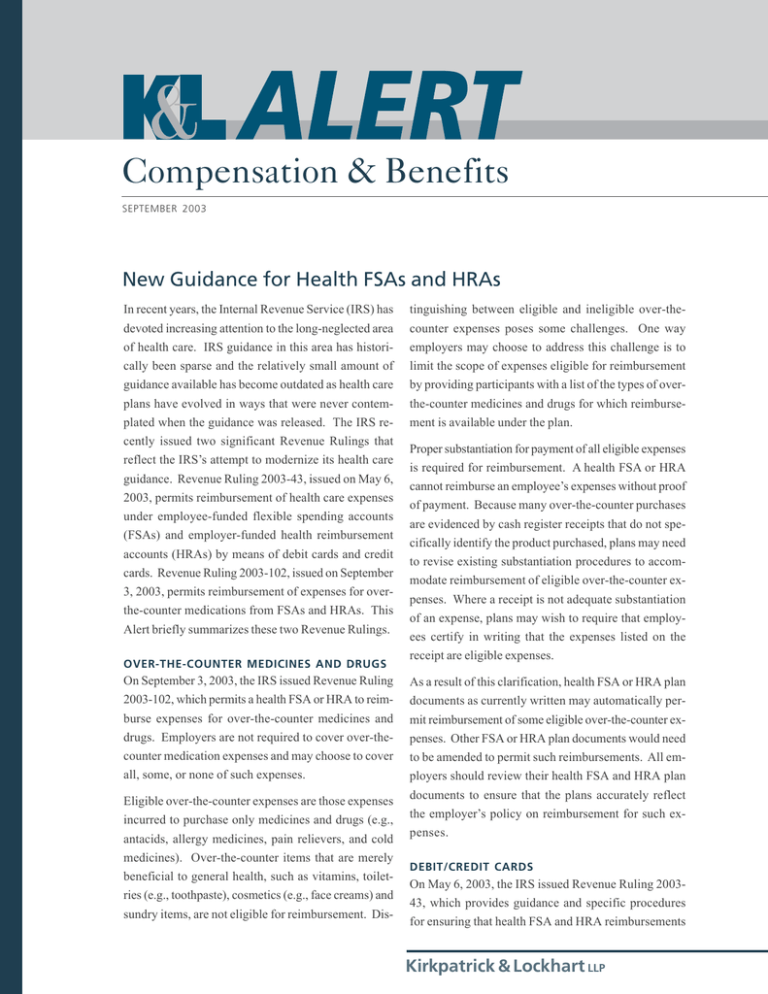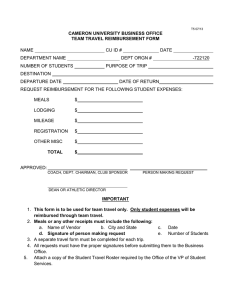
Compensation & Benefits
SEPTEMBER 2003
New Guidance for Health FSAs and HRAs
In recent years, the Internal Revenue Service (IRS) has
devoted increasing attention to the long-neglected area
of health care. IRS guidance in this area has historically been sparse and the relatively small amount of
guidance available has become outdated as health care
plans have evolved in ways that were never contemplated when the guidance was released. The IRS recently issued two significant Revenue Rulings that
reflect the IRS’s attempt to modernize its health care
guidance. Revenue Ruling 2003-43, issued on May 6,
2003, permits reimbursement of health care expenses
under employee-funded flexible spending accounts
(FSAs) and employer-funded health reimbursement
accounts (HRAs) by means of debit cards and credit
cards. Revenue Ruling 2003-102, issued on September
3, 2003, permits reimbursement of expenses for overthe-counter medications from FSAs and HRAs. This
Alert briefly summarizes these two Revenue Rulings.
OVER-THE-COUNTER MEDICINES AND DRUGS
On September 3, 2003, the IRS issued Revenue Ruling
2003-102, which permits a health FSA or HRA to reimburse expenses for over-the-counter medicines and
drugs. Employers are not required to cover over-thecounter medication expenses and may choose to cover
all, some, or none of such expenses.
Eligible over-the-counter expenses are those expenses
incurred to purchase only medicines and drugs (e.g.,
antacids, allergy medicines, pain relievers, and cold
medicines). Over-the-counter items that are merely
beneficial to general health, such as vitamins, toiletries (e.g., toothpaste), cosmetics (e.g., face creams) and
sundry items, are not eligible for reimbursement. Dis-
tinguishing between eligible and ineligible over-thecounter expenses poses some challenges. One way
employers may choose to address this challenge is to
limit the scope of expenses eligible for reimbursement
by providing participants with a list of the types of overthe-counter medicines and drugs for which reimbursement is available under the plan.
Proper substantiation for payment of all eligible expenses
is required for reimbursement. A health FSA or HRA
cannot reimburse an employee’s expenses without proof
of payment. Because many over-the-counter purchases
are evidenced by cash register receipts that do not specifically identify the product purchased, plans may need
to revise existing substantiation procedures to accommodate reimbursement of eligible over-the-counter expenses. Where a receipt is not adequate substantiation
of an expense, plans may wish to require that employees certify in writing that the expenses listed on the
receipt are eligible expenses.
As a result of this clarification, health FSA or HRA plan
documents as currently written may automatically permit reimbursement of some eligible over-the-counter expenses. Other FSA or HRA plan documents would need
to be amended to permit such reimbursements. All employers should review their health FSA and HRA plan
documents to ensure that the plans accurately reflect
the employer’s policy on reimbursement for such expenses.
DEBIT/CREDIT CARDS
On May 6, 2003, the IRS issued Revenue Ruling 200343, which provides guidance and specific procedures
for ensuring that health FSA and HRA reimbursements
Kirkpatrick & Lockhart LLP
made through debit or credit cards and other electronic
media will meet statutory requirements. With proper
employee certification and substantiation of expenses,
debit cards and credit cards may be used to reimburse
eligible FSA and HRA expenses.
Health FSA and HRA reimbursements are permitted only
for eligible medical expenses as defined under the Internal Revenue Code. To verify that a particular expense is in fact a medical expense eligible for reimbursement, all claims for reimbursements must be substantiated. Revenue Ruling 2003-43 provides acceptable
substantiation methods for such expenses paid for with
a debit or credit card. A debit or credit card reimbursement program must incorporate the following requirements:
card are deemed substantiated without further documentation:
■
Where the dollar amount of the transaction
equals the dollar amount of the copayment for
the service under the major medical plan of the
cardholder.
■
Where the expense is recurring and matches expenses previously approved as to amount, provider, and time period (e.g., for an employee who
refills a prescription drug on a regular basis at
the same provider for the same amount).
■
Where the merchant, service provider or other
independent third party provides information at
the time and point of sale verifying to the employer that the charge is for a medical expense.
This is known as “real time” substantiation. Verification may be submitted electronically (e.g., email, internet, intranet) or by telephone.
Employee Certification. The employee must certify
that (i) the card will be used only to pay for eligible
medical care expenses of the employee, and the
employee’s spouse and dependents, (ii) any expense
paid with the card has not been reimbursed, and (iii)
the employee will not seek reimbursement under any
other plan covering health benefits.
All other charges to the card (other than the three
categories of charges described above) must be
treated as conditional pending confirmation and
substantiation by submission and review of paper receipts. Paper receipts must describe (i) the
service or product, (ii) the date of the service or
sale, and (iii) the amount.
The certification requirement is met where the employee certifies as to the requirements above upon
enrollment in the plan and that the employee understands that such certification is reaffirmed upon each
use of the card. A form of the certification must be
printed on the back of the card.
A substantiation procedure that reviews only
sample claims based upon transaction amounts
and requires only those sample claims to be substantiated by submission of paper receipts is not
sufficient. Each reimbursement made through a
card must be adequately substantiated.
Limitation on Amount. The aggregate amount of
expenses that may be paid with a debit or credit card
must be limited to the amount of coverage available
under the employee’s FSA or HRA.
Authorized Merchants and Service Providers. Use
of the card must be limited to expenses incurred at
merchant or service providers with a specified merchant code relating to health care. Thus, the card
can only be used for services and products sold by
merchants and providers that have been specifically
approved by the employer.
Substantiation of Every Claim. The plan documents
must include substantiation procedures applicable
to every claim for reimbursement. In the following
circumstances, expenses paid with a debit or credit
Meaningful Correction Procedures. The plan documents should include correction procedures for
claims paid under the card that subsequently are
identified as impermissible. The guidance provides
the following correction procedure:
■
Upon identification of an improper reimbursement, the employee is required to repay to the
plan the amount of the improper payment.
■
Where the employee does not repay the amount
of the improper reimbursement, the employer may
withhold the amount of the improper payment
from the employee’s wages or other compensation to the extent consistent with applicable law.
■
For improper payment amounts that remain outstanding, the employer may use a claims substitution approach or offset the outstanding amount
against a later substantiated claim incurred during the same coverage period.
If none of the foregoing result in repayment of the improperly reimbursed amount, the employer should treat
the unpaid amount as ordinary business debt. In addition to the above requirements, cardholders should be
instructed to retain documentation for any expense paid
with the card (e.g., invoices and receipts).
The IRS also requires that payments made to medical
service providers through the use of debit or credit
card programs be reported by the employer to the recipient of the reimbursements on a Form 1099-MISC.
Generally, this reporting requirement applies if payments
of $600 or more are reimbursed to any single provider,
subject to certain exceptions.
Employers who choose to implement debit or credit
card reimbursements should review vendor contracts
to ensure that the substantiation requirements will be
satisfied. Plan documents should also be reviewed
and amended as necessary to address new substantiation and correction procedures.
The procedures under the guidance suggest that a card
must be automatically cancelled when the employee no
longer participates in the plan or terminates employment. This cancellation requirement is based upon the
premise that the employer will be unable to recover
improper payments. Therefore, although the guidance
appears to preclude the use of a debit or credit card by
former employees - - e.g., employees who have elected
COBRA or who are eligible for retiree medical HRA coverage - - it may be possible to interpret the guidance to
allow the use of debit or credit cards by former employees who have elected COBRA or who are participating
in a retiree medical HRA provided that the plan has
procedures sufficient to ensure recovery of improper
payments.
LINDA B. BECKMAN
lbeckman@kl.com
412.355.6528
If you have questions or would like more information about
K&L’s Employee Benefit Plans/ERISA practice, please contact
one of our compensation and benefits lawyers listed below:
Boston
Stephen E. Moore
617.951.9191 smoore@kl.com
Los Angeles
William P. Wade
310.552.5071 wwade@kl.com
New York
David E. Morse
212.536.3998 dmorse@kl.com
Pittsburgh
William T. Cullen
Michael A. Hart
J. Richard Lauver
Charles R. Smith
Richard E. Wood
Linda B. Beckman
Douglas J. Ellis
412.355.8600
412.355.6211
412.355.6454
412.355.6536
412.355.8676
412.355.6528
412.355.8375
wcullen@kl.com
mhart@kl.com
rlauver@kl.com
csmith@kl.com
rwood@kl.com
lbeckman@kl.com
dellis@kl.com
San Francisco
Laurence A. Goldberg
Kathleen M. Meagher
Katherine L. Aizawa
Marc R. Baluda
415.249.1043
415.249.1045
415.249.1044
415.249.1036
lgoldberg@kl.com
kmeagher@kl.com
kaizawa@kl.com
mbaluda@kl.com
Washington
William A. Schmidt
Eric Berger
202.778.9373 william.schmidt@kl.com
202.778.9473 eberger@kl.com
®
Kirkpatrick & Lockhart LLP
Challenge us. ®
www.kl.com
BOSTON
■
DALLAS
■
HARRISBURG
■
LOS ANGELES
■
MIAMI
■
NEWARK
■
NEW YORK
■
PITTSBURGH
■
SAN FRANCISCO
■
WASHINGTON
...............................................................................................................................................................
This publication/newsletter is for informational purposes and does not contain or convey legal advice. The information herein
should not be used or relied upon in regard to any particular facts or circumstances without first consulting a lawyer.
© 2003 KIRKPATRICK & LOCKHART LLP.
ALL RIGHTS RESERVED.


